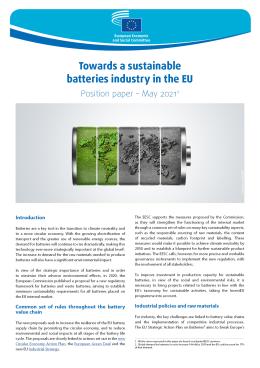European Economic
and Social Committee
Ekonomija ċirkolari
It-tranżizzjoni lejn Ekonomija Ċirkolari hija prijorità ewlenija fl-aġenda tal-KESE bħala soluzzjoni biex tiġi miġġielda l-kriżi klimatika u tiġi protetta l-pjaneta tagħna. Hija opportunità kbira għas-soċjetà ċivili peress li tista’ tgħin biex:
- tiżdied il-kompetittività tal-industrija Ewropea;
- jiġi promoss it-tkabbir ekonomiku sostenibbli;
- jinħolqu impjiegi ġodda.
Il-mudell “take-make-waste” tal-produzzjoni u l-konsum li għadu jiddomina l-ekonomija tagħna llum mhux biss qed jilħaq il-qofol tiegħu f’riżorsi moħlija, iżda wkoll qed idgħajjef il-ġlieda kontra t-tibdil fil-klima. Għall-kuntrarju tal-ekonomija lineari, Ekonomija Ċirkolari hija disinn riġenerattiv u restorattiv li jiffoka fuq il-ħolqien u ż-żamma tal-valur ekonomiku, filwaqt li jindirizza l-isfidi ambjentali globali bħat-tibdil fil-klima, it-telf tal-bijodiversità u t-tniġġis filwaqt li jrendi benefiċċji ekonomiċi.
L-aħbar it-tajba hija li t-tranżizzjoni ċirkolari diġà qed isseħħ fil-prattika. Il-partijiet ikkonċernati mis-soċjetà ċivili inklużi n-negozji, it-trade unions, l-akkademja u l-komunitajiet tal-għarfien, l-organizzazzjonijiet taż-żgħażagħ kif ukoll l-NGOs u gruppi ta’ interess oħra qed joħolqu u jimplimentaw ħafna inizjattivi ċirkolari fil-livell lokali u reġjonali. Il-katalizzazzjoni ta’ soluzzjonijiet ċirkolari u tat-tmexxija mill-partijiet ikkonċernati rilevanti hija l-aħjar opportunità tal-Ewropa biex taċċellera t-tranżizzjoni lejn Ekonomija Ċirkolari.
Bħala tali, il-Pjattaforma Ewropea tal-Partijiet Interessati tal-Ekonomija Ċirkolari, inizjattiva konġunta tal-KESE u tal-Kummissjoni Ewropea, hija pjattaforma stabbilita fl-2017 biex tlaqqa’ flimkien il-komunità tal-Ekonomija Ċirkolari fl-Ewropa. Il-pjattaforma mmexxija mill-partijiet ikkonċernati tappoġġja t-tranżizzjoni tal-Ewropa lejn Ekonomija Ċirkolari billi trawwem id-djalogu, tikkondividi l-għarfien u taqsam l-aħjar prattiki.




